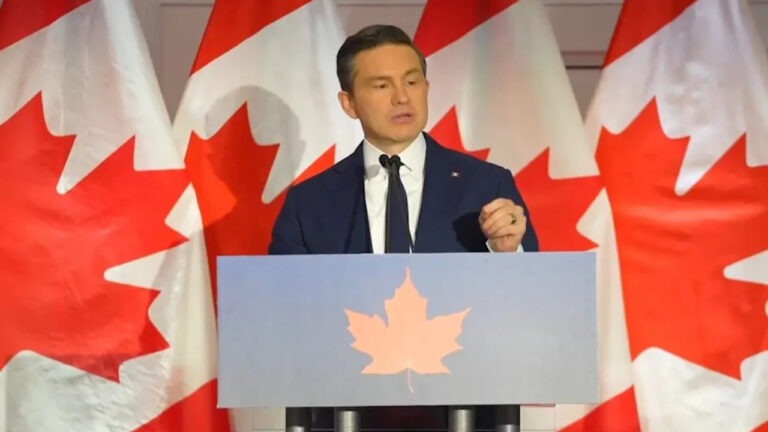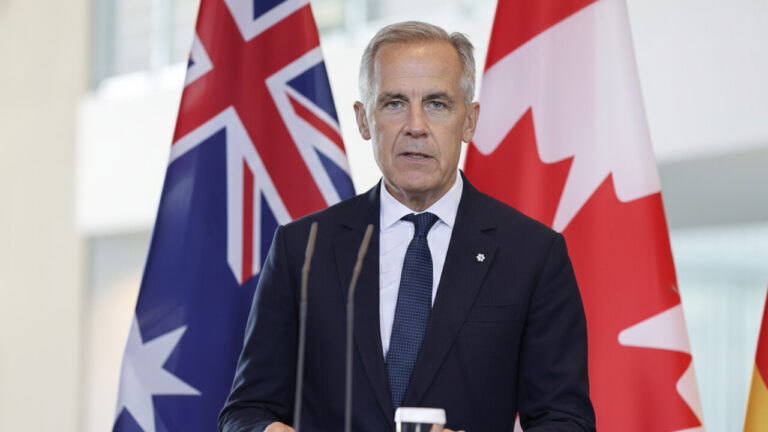
James Skinner
James is the Founder & Chief Executive of
CANZUK International in Vancouver, Canada
At the heart of CANZUK lies a shared commitment to values that have long defined these nations: democracy, human rights, civil liberties, and the rule of law.
As CANZUK International works to foster free movement, trade, and foreign policy cooperation among Canada, Australia, New Zealand and the United Kingdom, it must also champion a principle that underpins them all: freedom of speech.
This fundamental right is not merely an accessory to democracy—it is its lifeblood, enabling citizens to question, debate, and hold power to account.
Yet, across the western world, recent examples of free speech infringement signal a troubling trend, one that demands a renewed commitment to its protection as a cornerstone of the CANZUK alliance.
This fundamental right is not merely an accessory to democracy—it is its lifeblood, enabling citizens to question, debate, and hold power to account.
Yet, across the western world, recent examples of free speech infringement signal a troubling trend, one that demands a renewed commitment to its protection as a cornerstone of the CANZUK alliance.
This week, a story emerged from the United Kingdom that encapsulates the fragility of free speech even in nations with deep democratic roots. A grandmother was visited by police after she posted criticism of Labour politicians on Facebook. Her comments, while pointed, were an expression of political dissent—a right enshrined in democratic societies. Yet, the police intervention suggests a growing willingness to interpret speech as a threat rather than a liberty.
This incident is not isolated but reflective of a broader pattern across western countries, where laws designed to protect are increasingly wielded to suppress.
In the UK, the Public Order Act 1986 and the Communications Act 2003 provide the legal framework for such actions. Section 127 of the latter, for instance, criminalizes online messages deemed “grossly offensive” or “indecent,” a vague standard that empowers authorities to police speech with alarming latitude.
Sadly, the United Kingdom is not alone in this. In Canada, the Criminal Code’s Section 319 prohibits public incitement of hatred, a reasonable limit in principle but one that has been stretched to stifle debate. In 2024, a journalist faced scrutiny for reporting on a controversial government policy, with authorities citing “hate speech” concerns despite the absence of incitement. The vagueness of Canada’s hate speech laws, coupled with the chilling effect of potential prosecution, risks silencing voices that challenge the status quo.
Australia, too, has seen its share of overreach. The eSafety Commissioner’s 2024 demand that social media platform X remove a video of a Sydney church stabbing globally—not just within Australia—sparked outrage. When X geo-blocked the content for Australian users, the Commissioner insisted on a worldwide takedown, citing the need to protect citizens from accessing it via VPNs. This move, grounded in the Online Safety Act 2021, ignored the sovereignty of other nations’ free speech protections and set a dangerous precedent for extraterritorial censorship. The bishop who was attacked even opposed the removal, underscoring the disconnect between public sentiment and regulatory overreach.
New Zealand is also not immune. The Summary Offences Act 1981 prohibits disorderly behavior that disrupts public meetings, a law recently invoked to penalize protesters at a political event in 2024. While order is a legitimate concern, the broad application of such statutes risks criminalizing dissent. Additionally, proposals to reintroduce blasphemy laws—dormant since 1946—threaten to further constrict expression, particularly on matters of religion or culture.
Across the CANZUK nations, the legal mechanisms suppressing speech share a common thread: ambiguity. In the UK, the Online Safety Act 2023 empowers regulators to mandate the scanning of encrypted messages for “illegal content,” undermining privacy and free expression alike. Canada’s Bill C-63 proposes preemptive penalties for potential hate speech, shifting the burden from action to intent. Australia’s Racial Discrimination Act 1975, particularly Section 18C, penalizes speech likely to “offend” or “insult” based on race, a threshold so subjective it invites abuse. New Zealand’s Human Rights Act 1993 similarly prohibits speech that “incites hostility,” a term open to expansive interpretation.
These laws, while often born of noble intent—protecting vulnerable groups or maintaining public safety—too frequently morph into tools of control. Their vagueness hands disproportionate power to authorities, who can define “offense” or “harm” in ways that stifle legitimate discourse. For CANZUK to thrive as a beacon of liberty, it must confront this creeping authoritarianism head-on.
The CANZUK vision rests on more than economic or geopolitical convenience—it is a reaffirmation of shared values forged through history. The Magna Carta, the Westminster system, and the common law tradition bind these nations in a legacy of individual rights and accountable governance. Free speech is the thread that ties these principles together, enabling citizens to shape their societies without fear of retribution. When a grandmother in the UK, a journalist in Canada, a protester in New Zealand, or a platform in Australia faces censorship, that thread frays, weakening the fabric of democracy itself.
Human rights and civil liberties, as enshrined in documents like the Universal Declaration of Human Rights and national constitutions, demand robust protection of expression. The European Convention on Human Rights, to which the UK adheres, and Canada’s Charter of Rights and Freedoms explicitly affirm this right, subject only to narrow, necessary limits. Australia and New Zealand, though lacking formal bills of rights, inherit a common law presumption of liberty that includes free speech. To dilute this under the guise of order or sensitivity is to betray the rule of law these nations champion.
Moreover, CANZUK’s global influence depends on its moral authority. In an era where authoritarian regimes suppress dissent with impunity, these four countries must model a better way. By promoting free speech, CANZUK can inspire others to resist censorship, fostering a world where ideas—not coercion—drive progress. This is not a luxury but a necessity: a CANZUK that tolerates speech suppression risks losing its claim to leadership in human rights and democracy.
As a call to action across the CANZUK nations, we must advocate for clearer, narrower laws that protect expression while addressing genuine harm. We must resist the temptation to let regulators or politicians arbitrate truth, trusting instead in the resilience of open debate. And we must educate citizens about their rights, empowering them to defend this bedrock liberty.
While CANZUK must continue to advance diplomatic relations across the four countries, we must also advance an ethos where ideas flow as freely as people and goods—an alliance not just of nations, but of voices.
This incident is not isolated but reflective of a broader pattern across western countries, where laws designed to protect are increasingly wielded to suppress.
In the UK, the Public Order Act 1986 and the Communications Act 2003 provide the legal framework for such actions. Section 127 of the latter, for instance, criminalizes online messages deemed “grossly offensive” or “indecent,” a vague standard that empowers authorities to police speech with alarming latitude.
Sadly, the United Kingdom is not alone in this. In Canada, the Criminal Code’s Section 319 prohibits public incitement of hatred, a reasonable limit in principle but one that has been stretched to stifle debate. In 2024, a journalist faced scrutiny for reporting on a controversial government policy, with authorities citing “hate speech” concerns despite the absence of incitement. The vagueness of Canada’s hate speech laws, coupled with the chilling effect of potential prosecution, risks silencing voices that challenge the status quo.
Australia, too, has seen its share of overreach. The eSafety Commissioner’s 2024 demand that social media platform X remove a video of a Sydney church stabbing globally—not just within Australia—sparked outrage. When X geo-blocked the content for Australian users, the Commissioner insisted on a worldwide takedown, citing the need to protect citizens from accessing it via VPNs. This move, grounded in the Online Safety Act 2021, ignored the sovereignty of other nations’ free speech protections and set a dangerous precedent for extraterritorial censorship. The bishop who was attacked even opposed the removal, underscoring the disconnect between public sentiment and regulatory overreach.
New Zealand is also not immune. The Summary Offences Act 1981 prohibits disorderly behavior that disrupts public meetings, a law recently invoked to penalize protesters at a political event in 2024. While order is a legitimate concern, the broad application of such statutes risks criminalizing dissent. Additionally, proposals to reintroduce blasphemy laws—dormant since 1946—threaten to further constrict expression, particularly on matters of religion or culture.
Across the CANZUK nations, the legal mechanisms suppressing speech share a common thread: ambiguity. In the UK, the Online Safety Act 2023 empowers regulators to mandate the scanning of encrypted messages for “illegal content,” undermining privacy and free expression alike. Canada’s Bill C-63 proposes preemptive penalties for potential hate speech, shifting the burden from action to intent. Australia’s Racial Discrimination Act 1975, particularly Section 18C, penalizes speech likely to “offend” or “insult” based on race, a threshold so subjective it invites abuse. New Zealand’s Human Rights Act 1993 similarly prohibits speech that “incites hostility,” a term open to expansive interpretation.
These laws, while often born of noble intent—protecting vulnerable groups or maintaining public safety—too frequently morph into tools of control. Their vagueness hands disproportionate power to authorities, who can define “offense” or “harm” in ways that stifle legitimate discourse. For CANZUK to thrive as a beacon of liberty, it must confront this creeping authoritarianism head-on.
The CANZUK vision rests on more than economic or geopolitical convenience—it is a reaffirmation of shared values forged through history. The Magna Carta, the Westminster system, and the common law tradition bind these nations in a legacy of individual rights and accountable governance. Free speech is the thread that ties these principles together, enabling citizens to shape their societies without fear of retribution. When a grandmother in the UK, a journalist in Canada, a protester in New Zealand, or a platform in Australia faces censorship, that thread frays, weakening the fabric of democracy itself.
Human rights and civil liberties, as enshrined in documents like the Universal Declaration of Human Rights and national constitutions, demand robust protection of expression. The European Convention on Human Rights, to which the UK adheres, and Canada’s Charter of Rights and Freedoms explicitly affirm this right, subject only to narrow, necessary limits. Australia and New Zealand, though lacking formal bills of rights, inherit a common law presumption of liberty that includes free speech. To dilute this under the guise of order or sensitivity is to betray the rule of law these nations champion.
Moreover, CANZUK’s global influence depends on its moral authority. In an era where authoritarian regimes suppress dissent with impunity, these four countries must model a better way. By promoting free speech, CANZUK can inspire others to resist censorship, fostering a world where ideas—not coercion—drive progress. This is not a luxury but a necessity: a CANZUK that tolerates speech suppression risks losing its claim to leadership in human rights and democracy.
As a call to action across the CANZUK nations, we must advocate for clearer, narrower laws that protect expression while addressing genuine harm. We must resist the temptation to let regulators or politicians arbitrate truth, trusting instead in the resilience of open debate. And we must educate citizens about their rights, empowering them to defend this bedrock liberty.
While CANZUK must continue to advance diplomatic relations across the four countries, we must also advance an ethos where ideas flow as freely as people and goods—an alliance not just of nations, but of voices.
Heading photo: Flikr – Roger H. Goun under Creative Commons License Attribution 3.0 Unported
Share this:
Facebook
Twitter
LinkedIn
WhatsApp
Email





